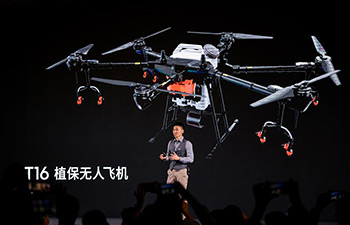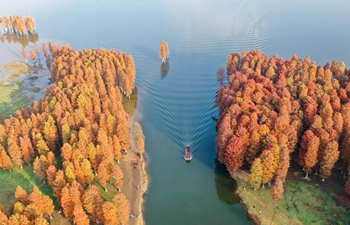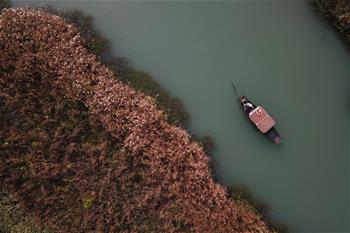by Yu Fei, Han Song, Hu Zhe
NANJING, Dec. 6 (Xinhua) -- Why do some brains discover the laws of universe, while others create soul-stirring music or paintings? How is memory and consciousness generated?
We can observe billions of stars and detect ripples in space, but we still barely understand our brains, which can fathom the universe.
Their sophisticated structure and the number of neurons are only estimates.
Now Chinese scientists are planning to draw the clearest yet three-dimensional map of the intricate neurons and blood vessels in the human brain.
This ambitious project is like taking 3D photos of a huge forest of nearly 100 billion trees, seeing not only the whole forest, but also every twig and leaf on each tree.
"Our current methods cannot see both the trees and the forest. We aim to develop new methods to obtain a high-resolution map to see clearly how the neural network is connected," said Luo Qingming, leader of the research.
Luo, president of Hainan University and chief scientist of the Suzhou Institute for Brainsmatics of the Huazhong University of Science and Technology (HUST), in east China's Jiangsu Province, said the research will help in analyzing the mechanisms of brain diseases, and promote the development of artificial intelligence.
"The continuous changes of neural networks and brain activities pose great challenges to the analysis of brain functions. But we believe that brain functions and activities depend on the basic cells, just as a circuit network depends on its basic unit - the electronic components," said Luo.
"Different types of neurons are the basis for the analysis of brain functions and for the diagnosis and treatment of brain diseases," he said.
INNOVATIVE METHOD
Luo, 52, was born in rural Qichun County, central China's Hubei Province. At middle school, he had to study by the light of a kerosene lamp. He still has a scar on his hand from an accident of chopping firewood after school to help feed his family.
In the 1990s, Luo was a photoelectron researcher in the United States and was the first-ever person to succeed in measuring brain activity by means of near-infrared optical imaging. His technology was awarded a U.S. patent.
However, he left the high-quality research conditions abroad and returned to China to work in his alma mater, HUST, in 1997.
"I feel that I should contribute to my country," said Luo, who launched his project with a starting budget of just 200,000 yuan (about 30,000 U.S. dollars) and a lab of 25 square meters.
Brain imaging is extremely difficult, as it requires expertise in different disciplines.
"The brain is as soft as bean curd. It is difficult to fix brain samples and mark the nerves and blood vessels inside. It took us three years to solve that problem," Luo said.
"We need researchers with different academic backgrounds, such as biologists and chemists to prepare brain samples, engineers and technicians with optical, mechanical and control technology to develop the imaging instruments, and computer talents to process data and display the results."
The team took eight years to develop a brain-imaging instrument with independent intellectual property rights.
The achievement was published on the journal, Science, at the end of 2010, and was ranked as one of the top 10 scientific advances in China in 2011.
MAPPING BRAINS
"If we compare the imaging system to a camera, we first made a black-and-white camera and took black-and-white pictures of a mouse brain," Luo explained.
Since then, his team has made a series of breakthroughs to take pictures in rich colors showing amazing details of the mouse brain.
In 2016, the team received an investment of 450 million yuan to set up the Suzhou Institute for Brainsmatics, a development reported in the journal, Nature.
In the spotless lab at the institute, a mouse brain sample, wrapped in resin like a piece of amber, is sliced into layers just one micron thick.
Each layer is scanned and imaged. About 10,000 layers are sliced to get a map of the whole mouse brain.
The images of the colorful neural and vascular systems shown on the computer look like intricate highway networks. This is the world's clearest map of a mammal brain.
"We have achieved success with mice, and are making efforts to map the brains of primates which are more advanced and complicated," said Li.
"Our ultimate goal is to lead the world to get a precise map of the human brain, which will help us uncover its secrets."
TECHNICAL CHALLENGES
Scientists estimate a mouse brain has tens of millions of neurons, and a monkey brain has billions, while a human brain has about 86 billion.
"We cannot map a human brain by just adding more instruments. The huge amount of data after imaging would pose great challenges for storage and analysis," Li said.
It's estimated that the data generated from imaging a human brain would be equivalent to 200,000 movies of 4K ultra-high-definition, which would fill all the storage space of the Sunway TaihuLight, China's most powerful supercomputer.
Computing is the biggest technical bottleneck, and mapping the human brain must wait for the development of IT technology, Luo said.
Human brain scanning and imaging also faces ethical challenges. "We mark the neurons in a mouse brain with transgenic technology and virus labeling technology, which cannot be applied to a human brain," Li said.
"There are countless technical problems to overcome, but we believe that with the development of technology, these problems will be solved."
The team cooperates with labs and institutes in the United States and provides data for brain research in Europe and other countries. But Luo is looking forward to the launch of China's own brain science program.
Brain science is listed as one of the major scientific and technological projects of China's 13th five-year plan (2016-2020).
"This research could help promote children's education, and facilitate the diagnosis and treatment of brain-related diseases such as depression, Parkinson's disease and Alzheimer's disease," said Luo.
"Once we have sufficient financial support and concentrate our efforts, it will be possible to get a high-resolution map of the human brain in five to 10 years."
(Xinhua reporters Xia Peng and Li Bo also contributed to the story.)

















